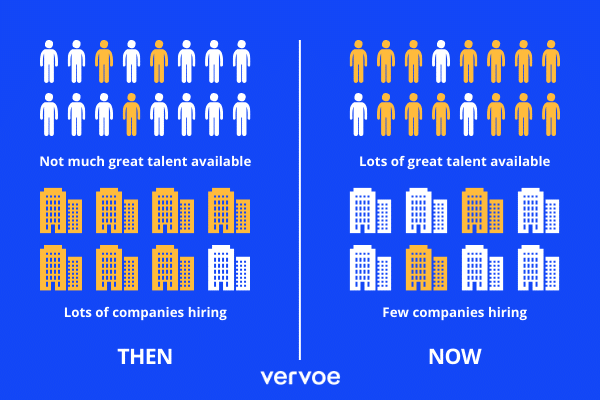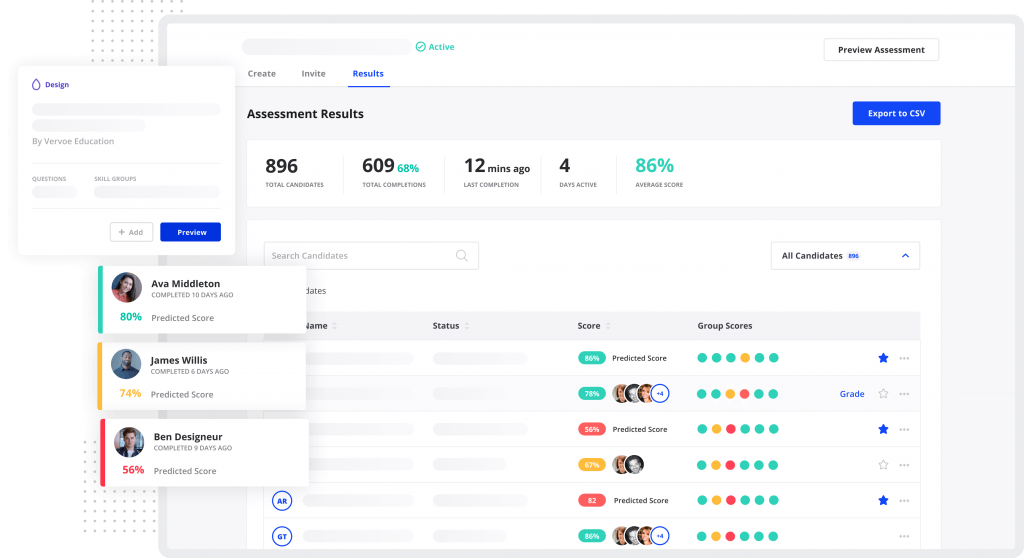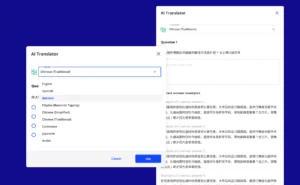Recruiters are now faced with a new problem: too many job applicants.
The war for talent has been replaced by the war for jobs
For the best part of a decade, there has been a shortage of candidates. Strong economic conditions have resulted in extremely low unemployment and the demand for candidates has outstripped supply. With the exception of retail and hospitality – sectors that attract thousands of candidates per role in any market conditions – and perhaps graduate programs, most recruiters have had to work hard to attract candidates.
Most companies have bought into the narrative of the “war for talent”, a term first coined in 1997 by management consulting firm McKinsey. The war for talent narrative assumes there is a major skills shortage and, as a result, firms are in a never-ending competition with each other for top talent. The focus on talent attraction is a mindset most recruiters have adopted and it has increasingly made recruitment more and more akin to marketing. Recruiters have become sellers of jobs and candidates are have become buyers of new job opportunities, often reluctant ones.
This has given rise to new product categories focused on wooing candidates, most notably employer branding and recruitment marketing solutions. Recruiters have focused most of their energy on attraction – not selection – and many of those who have worked in the profession for less than ten years have never really had to contend with candidate screening at scale. Screening hasn’t been a problem for them.

In March 2020 that dynamic was reversed. Not in one industry, not in one role type, and not in one geography – but right across the board. Gone are the days were only the Walmarts and H&M’s of the world attract thousands of candidates per role. Gone are the days where Silicon Valley startups have to bend over backward to find enterprise sellers or engineers. The market has shifted under our feet in a dramatic way and now every role has too many job applicants. The so-called war for talent is over, at least for now. Instead, we are seeing the emergence of the war for jobs. And it’s not pretty.
Wait a minute! Isn’t having too many applicants a good thing? Isn’t it what every recruiter dreams of?
The recruiting game has changed
There are only two variables that determine the quality of a new hire a company can make, excluding the impact of the company itself after that person starts working in the role. The first is the available talent pool – that is the quality of people the company is able to attract to the role. The second is the selection process – that is how good the company is at choosing the right person from the available talent pool. In the last decade most of the focus has been on the first variable – candidate attraction – and, unfortunately, that has come at the expense of the second – candidate selection.
We’ve heard all the reasons. “I don’t want to add friction to the process”. “We’re dealing with passive candidate so we can’t ask them to take an assessment.” “These people can get a job anywhere, why would they jump through hoops?”.
But now the talent pool has grown overnight. And not just incrementally, it has multiplied. At Vervoe we’re seeing a 4-6x increase in the average number of candidates being evaluated per role right across the board. The attraction problem has disappeared and it makes sense because fewer companies are hiring and many, many more people are applying for jobs. That’s just the market.
So now it’s all about candidate selection, and it turns out that having too many job applicants isn’t an easy problem to solve.
The traditional hiring process doesn’t cope with too many job applicants
The traditional hiring process – which consists of screening résumés and conducting job interviews – has been horribly exposed. Not only is it ineffective in predicting a candidate’s performance, but it also can’t cope with a high volume of applicants. There are two reasons companies stop screening résumés. Either they believe résumés don’t predict performance, or they have lots of candidates, too many résumés to screen and simply don’t have time.
Résumés merely contain a list of claims candidates make about what they’ve done in the past. Past experience doesn’t predict future experience. But even if it did, it turns out candidates lie on their résumés more often than not. Finally, résumés have been proven to perpetuate inequality. Most recruiters implicitly know that résumés don’t mean much. They only use them as a way of narrowing down the list of applicants because they can’t interview everyone. The result is invariably a shortlist of the wrong people. But now, even that isn’t realistic because most roles are simply attracting too many applicants. So the résumé believers are left with three choices:
- Spend a crazy amount of time reading résumés. Sounds painful.
- Screen most applicants our arbitrarily. Terrible for candidates and unlikely to result in good hiring outcomes.
- Replace résumés with something else.
High applicant volumes resulting from unemployment is hardly a new concept – it happens in every recession. What is new, however, is the simultaneous occurrence of such drastic changes to market conditions, on the one had, and the rapid evolution of technology designed to solve this exact problem, on the other.
Talent assessments at scale
When we launched Vervoe in 2018 the concept of asking candidates to do skills assessments and then ranking them based on how well they perform was completely novel. The exception was engineering, an industry that had already figured out that résumés and chitchat-style interviews don’t predict performance and was used to doing coding challenges. But everyone else was still playing the résumé and face-to-face interview game. On top of that, we were asking our clients to stop screening résumés altogether and use skills assessments right at the top of the hiring funnel. The idea of giving every applicant an opportunity to prove their skills seemed like an outrageous proposition to many companies.

The early adopters were either companies in a lot of pain due to a very high volume of applicants, or companies who shared our beliefs about giving every candidate a chance based on skills. We saw the same behavior over and over again. First, companies started testing skills in the middle of the funnel, and then they’d get comfortable and move the assessment to the top of the funnel. The efficiency benefits were too hard to ignore and the quality improvements were undeniable. No more guessing who to interview based on meaningless résumés, no more missing out on hidden gems, no more mind-numbing phone screening. Everyone is evaluated based on performance of job-related tasks and skill testing. Every applicant is on an equal footing, regardless of background or privilege. There was no turning back.
The sudden change in market conditions means that most companies are now like to have the same paint point – too many applicants. There will still be some hard-to-fill roles, but they will be the exception rather than the rule. Recruiters need to switch their focus from marketing to candidate evaluation, which is a very different skill. And it’s not easy. With the right mindset, and the right process, having “too many applicants” for your role can and should be an advantage, not a burden. The time you spend filling each role shouldn’t go up based on the number of applicants that role attracts. That’s what technology is for. Every company can, and should, take advantage of the recruitment processes design for high volume hiring.




























